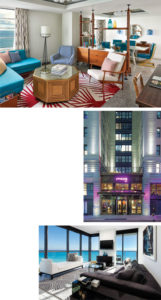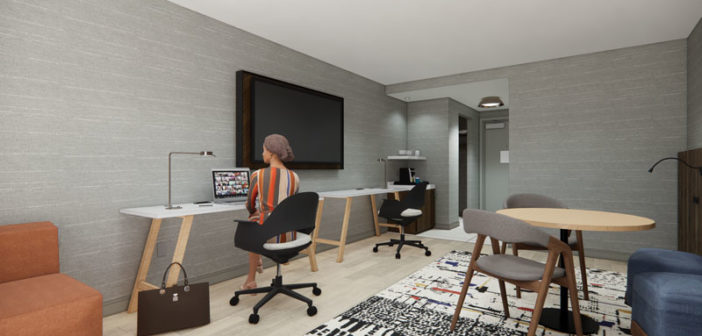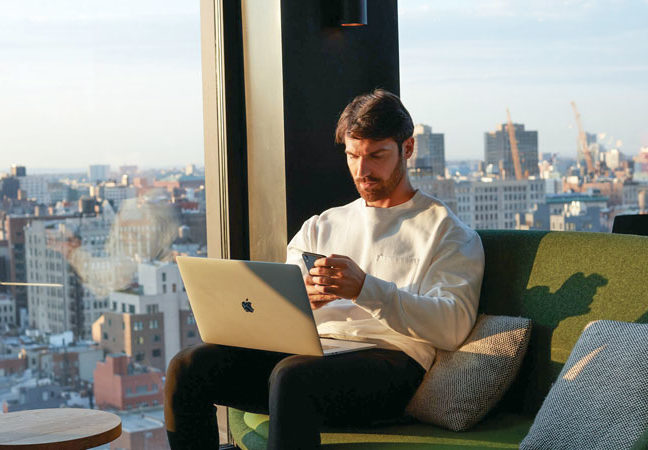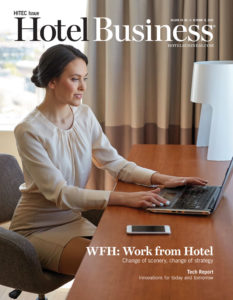As the COVID-19 pandemic began, social distancing required many offices to close around the globe, making it necessary for employees who could to work from home.
While initially working from home had a bit of novelty for some, as days turned into weeks and weeks turned into months, a sort of monotony and fatigue set in for many of them—not to mention the aggravation that came from interruptions of kids, pets and other distractions. Now, hotels—looking to make up for revenue lost from dropping occupancy levels—are stepping in to offer workers a chance at a change of scenery—and the perks that one can’t get from home.
“While work-from-home was enjoyable for some time, many are craving an escape from home to get creative, take meetings, etc., that doesn’t fold into their personal space,” said Carolyn McCammon, director of sales, marketing and events at The Confidante Miami Beach in Florida, which is one of more than 60 hotels that are part of the Work from Hyatt program, which offers special packages and amenities to those working from a hotel.
Mitchell Hochberg, president of Lightstone, owners of a diverse portfolio across the country, including the Moxy Hotels in New York City, agreed. “One clear factor is that people are getting fatigued with the monotony of working from the same place for six months and wanting to get out,” he said. “Particularly, people who have kids—some of them are going back to school and some are not—and they need quiet. Not everyone has the advantage of having a house where they can go into an office, close the door and have the privacy to do that and concentrate. I think that has been a big part of it.”
Another factor that has people looking at working from a hotel is that some offices are partially re-opening. “They go into the office if they need to have a meeting, but they can stay nearby in a hotel, be isolated, work in a safe environment and then pop over as opposed to commuting back and forth,” said Hochberg. “There are a number of corporate clients that are now encouraging their employees to stay in our hotels for two or three nights during the week, but come into the office during the day to avoid the commuting…so if they can have someone come in on a Tuesday morning at a non-peak hour, stay in the city for three days, come into the office, but be able to go back to the hotel for the evening, it is another way we have been able to see a different pattern of guests in the hotels.”
The pandemic will also cause companies to re-evaluate their office needs. “We are slowly starting to see what is going to be a trend going forward in office space, going back to what we were all seeing 15, 20 years ago where a lot of companies had smaller offices in more remote locations in the suburbs and might have a little bit bigger office in the city instead of having all their staff together in an urban environment,” said Kristin Cerutti, senior designer in the workplace studio at Nelson Worldwide. “We are slowly starting to see companies rethink and go back to that because then you don’t have to deal with elevators and cramming people in to get up 50 flights. There is something to be said for all these [hotels]that already exist and that are in a variety of locations. I could just go four blocks to find one versus having to commute 30-45 minutes to two hours depending on where you live to get to a place to do your work if you didn’t want to do it at home.”
Rachael Lison, senior interior designer with Nelson Worldwide’s hospitality studio said that this situation is a great opportunity for all hotels. “It could be an extended-stay that has some kitchen amenities in it,” she said. “Or it is an opportunity for a boutique hotel that maybe feels a little bit nicer than your dining room table. It is accessible at all levels in terms of accessible for the hotel to do, but also accessible for anybody to go to a hotel to do it. Hotels are everywhere, so there is an opportunity to go downtown. There is an opportunity to drive down the street, so it makes it really accessible for anybody to go into a hotel and use it for a day or a few hours, for whatever reason they need.”
She said that hotels also have an advantage in promoting their safety and cleaning initiatives. “They created these partnerships with Lysol or these other cleaning companies to really figure out how they could communicate with guests that their location is safe by welcoming them back and saying, ‘Things look a little bit different, but we are still the same brand you have always known. We have the amenities that you love. We are all doing things a little differently, but the hotel is no different. We have spent a lot of time making sure that you are safe.’ They can really lean into the relationship they have already cultivated with their guests, just in a different way.”
Lightstone’s three Moxy hotels added an air filtration system to purify the air. “We are incredibly focused on health and safety, so very early on, we installed AtmosAir, an air filtration system that continuously monitors, disinfects and purifies the air in the hotel,” said Hochberg. “It has been working well and people are comforted by it. We do the electrostatic disinfection in the rooms and all of the public spaces. Because we are Marriotts, Marriott has instituted 200 cleaning protocols, which has been a bit overwhelming for us, but has actually made us as clean as a hospital would be, and I think that is one of the things that is really necessary today to get people to be comfortable going into a hotel.”

Hotels have added a number of amenities and made changes to their operations to make working from their hotels desirable. Top to bottom: The Confidante Miami Beach; Moxy Times Square; W South Beach
Hotels can also be a neutral place to meet. “We are slowly starting to see people on the workplace side of things start to get out of their office,” said Cerutti. “Our staff is slowly starting to go out and meet with vendors. Some of our clients are willing to meet in person, but where do you do that right now because a lot of office spaces, the buildings, have been closed down? Having a neutral place to meet is good. If you went for a day to work in a hotel room, then you can easily just run down and meet with someone in a neutral zone to have a drink after. This way you are not bringing someone into your house, or again, not traveling a long distance. Instead, having that dedicated space to be able to meet safely is a really big perk right now.”
Hochberg said that offering working space at his three Moxy Hotels in Manhattan has helped fill some of the guestrooms. “We started to reach out individually to a lot of corporate clients, both individual clients and the companies, and then did a little bit of marketing about availability—either a day rate or to stay overnight and be able to work in the rooms as well,” he said. “We started to get some very good traction from it.”
He said that the properties were great for people to work in, and the transition for them was easy. “The rooms are very comfortable to work in. We didn’t have to redesign the rooms. We were fortunate that the way the rooms were designed facilitated it. A lot of our desks can be folded up and put on a peg wall so when you are not working, you don’t have a surface that is in your way, which has been great. We have studios in all of the hotels that people can reserve and either take a meeting or get out of the room and work in the studio, which are part of the lobbies, but are private, which has been great. We have been allowing guests who have long-term stays with us to use our suites for business meetings, so that if you have a room and have been staying on a long-term basis, we will let you use the suite for free for a business meeting, which people really like.”
Nelson Worldwide’s Lison said that when it comes to offering workspace at hotels, management can do a lot or a little in terms of changing the design of rooms. “Obviously, the very bare minimum is to use hotel rooms exactly as they are. The next layer is you can start to take the beds and mattress out of the rooms so it feels less like a bedroom and either rent or utilize some of the lounge seating that we have all started designing to be incredibly multifunctional. You can take pieces from either the lobby or you can take ones that are unused from boardrooms or lounge areas that aren’t getting a lot of use right now, and bring those in and create a lounge seating group in addition to the desk area in the guestrooms, so you are allowing guests to work however they would like.”
While some hotels don’t need to make any changes to their offerings to offer a place for guests to work, others do. “During the pandemic lull, our team gave the hotel a cosmetic facelift (as we prepare for some new exciting happenings), which has brought a new sense of sophistication that pays tribute to the history of the building and the hotel’s role model, Babs,” said McCammon. “We recreated a new space for community in our lobby, as well as peace and comfort in our flex meeting rooms, for every working guest to fuel their spirit and creativity while working virtually through these unprecedented moments. We also added more tech aspects to our meeting spaces to allow for safe micro-meetings.”
When the W South Beach returns this November after a $30-million renovation, it will have improvements designed for working from the property. “As many companies and schools went remote, the demand for flexible spaces for work and online learning shot up, so we wanted to create a comfortable work remote space for guests that promotes work/life balance,” said Rick Ueno, general manager, W South Beach. “People are looking to shake up their at-home routine and feel the spirit of travel again so we’re reinvigorating the energy of South Beach with a brand new $30-million redesign that offers light, airy spaces that bring the ocean in for guests to connect, and work virtually and later disconnect at our new Away spa.”
Hochberg said the Moxy Hotels have added new amenities for those working from the properties. “We never had room service before,” he said. “We now have room service and the room service is contactless, which is great. A guest gets a QR code when they check in. The QR basically gives you a menu and you can order almost anything you want from 6 a.m. to midnight. It gets dropped at your door without seeing anybody. That has been hugely popular with our guests and particularly the guests who are working there because they don’t have to leave the room for lunch if they don’t go into a public space. And quite candidly, in midtown Manhattan, there are still not a lot of restaurants that are open, so it gives them the ability to get all their meals as well.”
While adding work from hotel guests has been a welcome addition to the Moxy properties, it has not made up for all of the lost business caused by the pandemic. “Any incremental business is extremely helpful today, but I wouldn’t say that it has been significant,” he said. “You are looking now for green shoots and to see where you can have something that can help. It clearly is one of the few areas that we are starting to see an increase in use, and we think will be coming even more popular during the next 12 months until a vaccine is widely available. While today it hasn’t been that significant in terms of bottom line, the incremental business has been greatly appreciated and we anticipate it growing incrementally.” HB
CitizenM launches work from hotel subscription services
AMSTERDAM—CitizenM has launched two new subscription services to allow guests to work from its hotels anywhere around the globe—something it sees as the future of work.
The Corporate Subscription by CitizenM is a sleep/work/meet package for companies with remote workers who travel regularly; distributed teams who need to (or want to) gather on a semi-regular basis; and local individuals who need a better alternative to working from home.
For $600/month, one employee can work at any of the brand’s 21 hotels’ living rooms anytime they want, sleep for three nights (including a welcome drink and breakfast), use the meeting rooms, add more nights or meeting room hours at a 10% discount and entertain clients at CanteenM and CloudM rooftop bars.
“It doesn’t matter if you are going to travel to New York, Paris, Amsterdam or Seattle,” said Lennert de Jong, chief commercial officer, CitizenM. “It is one global monthly subscription and if you buy it for a year, you secure the price, of course, but you also get a month for free, so there is an incentive to book this further out. The way you really have to see this is further out. We looked at the pricing of a WeWork subscription. We looked at the pricing of hotel rooms and meeting rooms and we said, ‘For the price of what you pay for a half-day meeting room, for the price you normally pay for three hotel rooms, and the price that you pay for office space, you get all of it in one subscription.’”
The Global Passport by CitizenM is a fixed-rate stay option for “digital nomads who want to travel the world without missing a beat at work, with the ultimate flexibility of deciding on a month-by-month basis,” according to de Jong.
For $50/night when purchasing one full month, subscribers receive the ability to stay at any CitizenM property for 30 consecutive days and discounts on food and beverages. The price of a full month ($1,500) is less than a month’s rent for a central location in a city like London, New York, Amsterdam, Paris, etc., according to de Jong. There are no blackout dates, and the only requirement is a minimum of seven nights at any one location (and a maximum of 30 nights at one location).
The company came up with the subscriptions because there has been a shift in the way people work—even before the pandemic forced millions to work from home and not travel to their offices.
“What we believe in—and what we heard from the research that we have been doing as part of the subscription work—big, small, American, French, Dutch companies, it is all the same,” he said. “More people were already working from home than ever before and then everybody was forced to do everything from home.”
What will also make the subscriptions more useful is that—because many people having successfully transitioned to working remotely—they realize that they don’t need to live in major metropolitan areas to be near their jobs. “We believe that people will move out of the big cities a little bit more,” said de Jong. “Not all people will move out of the big cities, but some people will because they don’t have to come to work every day. Why would you pay $2,500/month for a small Manhattan apartment, if for the same amount of money, you can live on the coast a two or three-hour driving distance from New York? You wouldn’t do that if you were forced to commute to work every day, but perhaps you would if you only have to go to the city once or twice.”
CitizenM has also found that companies are downsizing their office space. “They will optimize the space, but they will require less space because people are using it less,” he said. “We’ve had conversations with companies that say they don’t need to go to the office, but they need to socially connect.
He continued, “They no longer need an office, but they need other things. What do they need? They need a roof under which they can have meetings, they can have a dinner, maybe stay over. That is why we have had a lot of feedback already for our subscription efforts. A lot of companies are saying, ‘Wow, this is really interesting and matches what we believe will be the new normal after this whole lockdown.”
De Jong said the company is focusing on the subscriptions really taking off during post-pandemic time period. “It is not that we expect to sign 1,000 corporate subscriptions next month,” he said. “We want to fill the pipeline and get interest. The positive aspect is that a lot of companies said that this is very innovative, and they will put it on the list.”
The subscriptions also make a lot of business sense for the company, according to de Jong. “One thing that is not a secret in the hotel industry is that contracts with corporations are worth exactly nothing,” he said. “If CitizenM does a contract with company A, company A gets a certain price, but do we get cash in advance? No. The price is based on a commitment that the company will put certain room nights into the city, but that commitment is never really hard.”
He continued, The only thing that the hotel company can say is if you don’t make these targets, your price will go up. With a subscription, we would be entertaining lower pricing than what the companies would normally attract, but we will take the cash in advance, so the commitment is hard. Also, the commitment is for longer, so what we really wanted to attack is the yearly RFP process, and get into a situation where we could put a customer lifetime value on any subscriber that we have on our data list.” —Gregg Wallis



